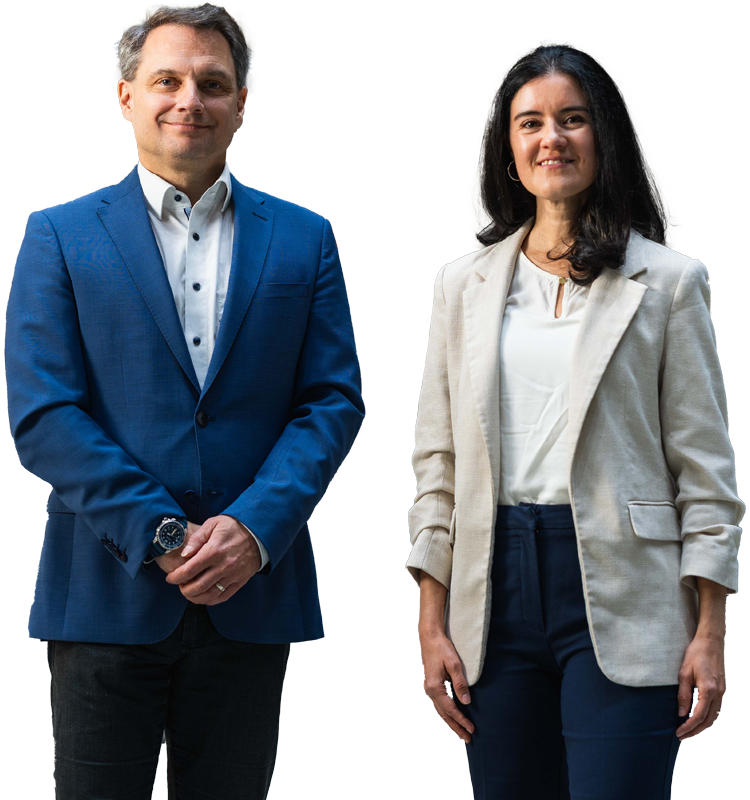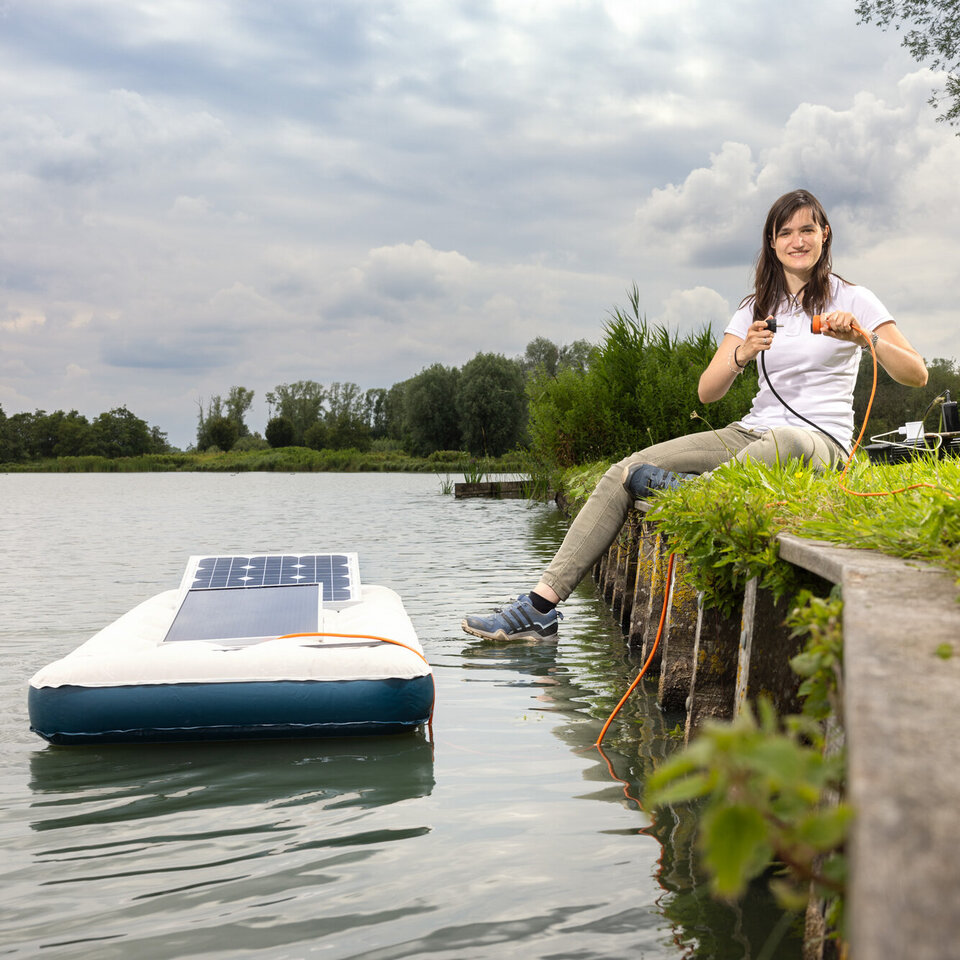The Dutch power grid is becoming increasingly overloaded, affecting households and delaying the electrification of heavy industry. Today’s power cables are also not physically capable of transmitting such high loads. At Delft, we are investigating an important solution: energy hubs.
An energy hub is a smart, decentralised energy system that coordinates the generation, consumption, storage and conversion of different energy carriers within a specific area – whether it be a home, a neighbourhood or an industrial site. By deploying energy hubs, the generation, transmission, and use of renewable energy can be accelerated in sectors still reliant on gas. They promote energy savings, relieve and strengthen the energy grid, and even contribute to social cohesion within communities.
At TU Delft, research is being conducted into various types of energy hubs – for large industries, offshore applications, greenhouses, business parks (such as TU Delft Campus), neighbourhoods and homes. This research drives innovation, leading to both technological and societal breakthroughs and ultimately results in a more sustainable and future-proof energy system.

Student Story
Unburdening the power grid with energy hubs: here’s how it works
Technically, it can be done, but in practice, it rarely succeeds: better matching the supply and demand of energy users to generate and use more power with the same grid. For her graduation project, TU Delft Odile Niers designed four interventions that succeed in initiating energy hubs in business parks.

Student Story
How the sun can shine for green energy from the sea
Sophie Broekers has discovered how offshore wind farms can deliver their electricity to land more cost-effectively through their hugely expensive cables. During her master’s project, she simulated a floating solar farm nestled among the wind turbines in the North Sea, yielding promising results.
News & Stories
Tackling energy poverty
Abhigyan Singh explores how we can ensure a just and fair energy transition by collaborating with residents and local initiatives. In this video, Abhigyan shows how he is involved in the LIFE project in the southeastern part of Amsterdam, where they aim to combat “energy poverty” using energy hubs. An energy hub is a decentralised energy system, making it well-suited to integrate with the social, cultural and economic life of people in specific neighbourhoods. Abhigyan is an Assistant Professor of Converging Design, Energy & Anthropology at the Faculty of Industrial Design.
| Watchtime: 4:00 min.
Mini-documentary ESP Lab
Imagine you have been working quietly for years in the confines of a large academic institute, when suddenly the spotlight turns in your direction. This is exactly what happened to Peter Palensky, professor at TU Delft. His specialism – intelligent electricity grids – has suddenly become a hot topic in recent years. The rapid transition to renewable energy has raised an important question: is our existing electricity grid capable of withstanding such far-reaching changes?
| Watchtime: 12:23 min.
Episode 5: Smart Energy Hubs and Sunny Predictions
Anic van Damme speaks with Machteld van den Broek, professor of Energy System Integration at TU Delft, about the new research project "DEFLAME," which focuses on the electrification of the Port of Rotterdam and reducing natural gas usage. She also visits Ties van der Heijden, founder of Pythia Energy Intelligence, who explains how his start-up uses new technologies, such as solar energy forecasting, to help balance supply and demand within energy networks.
The co-host this time is Angela Hulst, Innovation Manager at Stedin. She gives us an update on smart solutions like energy hubs and the optimization of existing systems.
-
During the National and Delft Climate Week, everyone in the Netherlands showcases what they can do for the climate. TU Delft is doing this by raising awareness of research into various types and forms of energy hubs: smartly managed, decentralised energy systems.
Professor Peter Palensky explains why TU Delft is focusing on energy hubs during the National and Delft Climate Week: ‘We need to electrify the last three sectors that are still entirely gas-based – the transport sector, industry and our heating. One way to achieve this is by converting electricity on industrial sites into hydrogen or other synthetic gases, and for that, you need energy hubs.’
-
During the International Climate Summit in Baku, EU member states are calling for the global warming limit to be set at a maximum of 1.5 degrees. Energy hubs play a crucial role in accelerating the energy transition: they efficiently integrate renewable energy sources, promote local energy production and foster collaboration between sectors. Furthermore, they help reduce dependence on fossil fuels and strengthen the resilience of the energy network, which is vital for achieving our climate goals.
-
Behavioural Insights Day (in Dutch: de Dag van het gedrag), organised by the Behavioural Insights Network Netherlands (BIN NL), is a collaboration involving all ministries and national services. It's a great opportunity to read the insights of scientists Emile Chappin and Mariëlle Rietkerk regarding the role of behaviour in accelerating the energy transition.
Press officers for Climate & Energy
Dave Boomkens
06 3408 1461
d.j.boomkens@tudelft.nl
Pauline Bijster
06 4842 1089
h.p.bijster@tudelft.nl
Questions or collaboration?
We are always open to introductions and new partnerships that foster innovation and progress.
Peter Lucas
06 4249 8373
p.lucas@tudelft.nl
Arnoud van der Zee
06 4821 6215
a.e.vanderzee@tudelft.nl








![[Translate to English:] [Translate to English:]](https://filelist.tudelft.nl/_processed_/e/b/csm_Web_TU_AleksandraLekic_7784_A_81332f69a2.jpg)
![[Translate to English:] [Translate to English:]](https://filelist.tudelft.nl/_processed_/d/7/csm_Curius-groepsfoto_7ef704f771.jpg)
![[Translate to English:] [Translate to English:]](https://filelist.tudelft.nl/_processed_/8/7/csm_tud_stofsc_m_rietkerk_HR_EWF_241010_Z6B2768_a929aa8b02.jpg)


![[Translate to English:] [Translate to English:]](https://filelist.tudelft.nl/_processed_/9/5/csm_csm_Battolyser%20Magnum%20power%20plant%20RWE_3_2668cf0108_4175395313.png)
![[Translate to English:] [Translate to English:]](https://filelist.tudelft.nl/_processed_/0/d/csm_0008-AHK-Vaessen_1c4ece639f.jpg)
![[Translate to English:] [Translate to English:]](https://filelist.tudelft.nl/_processed_/5/f/csm_Story%20AHKL-Goncalo-0008_Social_ba9f22e1f9.png)
![[Translate to English:] [Translate to English:]](https://filelist.tudelft.nl/CiTG/Onderzoek/Stories%20of%20Science/Geoscience%20%26%20Engineering/Een%20aardwarmtebron%20voor%20onderzoek%20op%20de%20campus/phil-on-mount-4.gif)
![[Translate to English:] [Translate to English:]](https://filelist.tudelft.nl/_processed_/a/4/csm_Header%20Ondergrondse%20warmte-opslag%20slaat%20een%20gat%20in%20de%20warmtetransitie_bedfa46a99.jpg)

![[Translate to English:] [Translate to English:]](https://filelist.tudelft.nl/_processed_/1/4/csm_De_uitdaging_op_tijd_7_miljoen_gebouwen_energieneutraal_krijgen_header_661eab45af.jpg)
![[Translate to English:] [Translate to English:]](https://filelist.tudelft.nl/_processed_/8/4/csm__FAU9691kl_183561a0df.jpg)